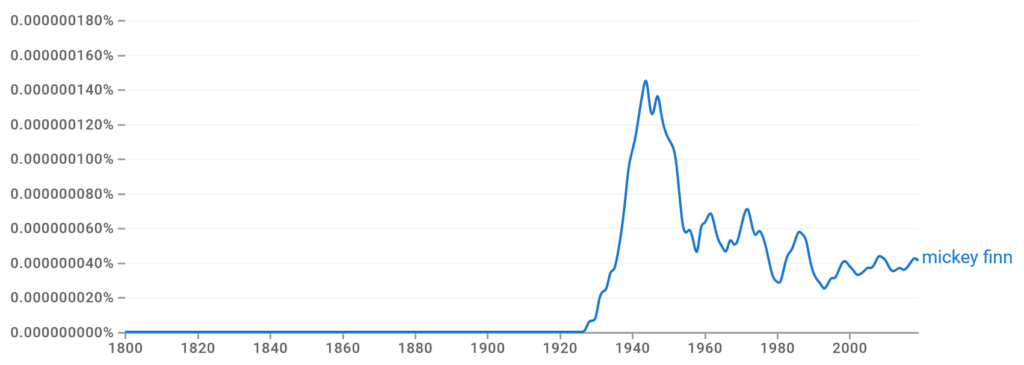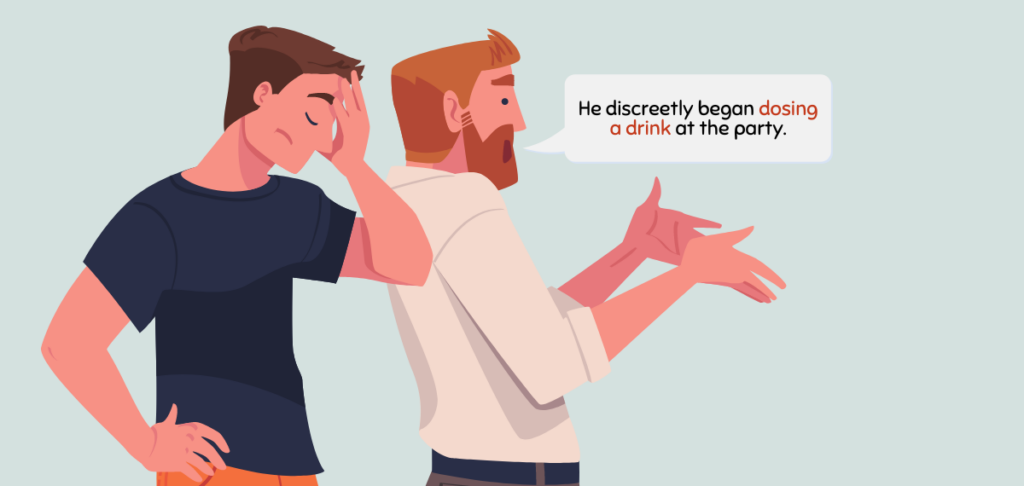A Mickey Finn is a drug that someone secretly puts into a drink to render the drinker unconscious, thus slipping them a Mickey Finn. Obviously, slipping someone a Mickey Finn is a severe crime.
Idioms, like slip a mickey, use words and phrases figuratively rather than literally. These phrases are used to create analogies and paint word pictures and are popular in informal conversation. Learning how and when to use idioms can help you master the complex nuances of the English language.
In this article, we will explore the idiom’s meaning, origin, synonyms, antonyms, and different ways to use it. We’ve even included a quick quiz at the end to test your knowledge!
Keep reading to learn how to use the idiom in your everyday conversation and writing.

What Does the Idiom Mickey Finn Mean?
The idiom slip a mickey means to secretly add a drug or substance into someone’s drink to cause them to become unconscious or unresponsive.
A mickey is an abbreviation for the Mickey Finn, and the two terms are interchangeable. Note that the term mickey is not capitalized, while the term Mickey Finn is.
According to the Cambridge Dictionary, Mickey Finn means “a drug added to a drink, especially an alcoholic drink, in order to make the person who drinks it unconscious.” Collins Dictionary names Mickey Finn as “a drink of liquor to which a powerful narcotic or purgative has been added, given to an unsuspecting person.
Alternative Meanings
Mickey Finn is a brand of cocktail liqueurs used to create elaborate party drinks. That’s a clever play on words, using the idiom to refer to the literal act of adding something to a drink.
A Mickey Finn is also a fishing fly that’s said to be capable of catching just about any popular game fish.
How Is Mickey Finn Commonly Used in Context?
Mickey Finn or slipping someone a mickey is an expression that’s most commonly used informally in conversation and writing. Use the idiom casually in conversion for the most impact, and remember that context might be essential for non-English speakers to understand exactly what you mean.
The following sections will tackle the different ways to use this idiom, provide examples of its use, and offer some tips for using it effectively.
What Are the Different Ways to Use Mickey Finn?
- Slipping a Mickey Finn: “Bartenders must never slip a Mickey Finn; it’s illegal and unethical.”
- Being on the alert for a Mickey Finn: “Stay alert for a potential Mickey Finn in crowded settings.”
- Warning about Mickey Finn practices: “Emori shared cautionary tales about the dangers of a Mickey Finn.”
- Discussing the consequences of a Mickey Finn: “The documentary explored legal repercussions for slipping a Mickey Finn.”
- Avoiding a Mickey Finn situation: “Abigail takes precautions to avoid a Mickey Finn situation.”
Remember, the term Mickey Finn is associated with deceitful actions, and these examples highlight various contexts in which the idiom can be applied.
Where Can You Find Examples of Mickey Finn?
Although informal and casual, Mickey Finn or slipping someone a mickey is a popular idiom regularly used to express lacing someone’s drink with a drug of some kind.
The phrase is commonly used in casual conversation and can be found in various forms of media, including:
- Literature
- Movies and TV shows
- Songs
- Conversations and personal anecdotes
- Online resources
Here are some examples of it being used in online publications:
“He said his older brother was very upset and thought he’d been drugged, that someone had given him a Mickey Finn.” (The San Antonio Express-News)
She was drugged with what was then known as a ‘Mickey Finn’ and could be Rohypnol and woke up on the man’s living room floor to find him having sex with her. (The Daily Mail)
Some dame had slipped me a mickey and stolen my clothes. (The Washington Post)
What Are Some Tips for Using Mickey Finn Effectively?
Here are some tips for using the idiom Mickey Finn or slipping him/her a mickey in your writing or conversation:
- Context matters: Use Mickey Finn in situations involving deceit, trickery, or the drugging of drinks.
- Cautionary usage: Employ the term to warn about potential dangers, especially related to substances added without consent.
- Avoid overuse: Reserve Mickey Finn for situations where deception or harm is a central theme to maintain its impact.
- Clarify deceptive actions: Provide context when using the term to ensure a clear understanding of the deceptive or harmful actions involved.
- Consider formality: Be mindful of the formality of the situation, as Mickey Finn is more commonly used in informal or cautionary contexts.
- Educational context: Use the term in educational discussions about the history and implications of drugging someone’s drink.
- Be mindful of sensitivity: Recognize the serious nature of the term and use it judiciously, considering potential sensitivity to the topic.
What Is the Origin of the Idiom Mickey Finn?

The idiom Mickey Finn is believed to have originated in the 1890s, deriving its name from a bartender associated with the Lone Star Saloon and Palm Garden in Chicago at the turn of the last century.
The establishment, known for its dubious reputation, allegedly had a bartender who surreptitiously added substances, termed Mickey Finns, to customers’ drinks, intending to incapacitate them for later theft.
The existence of this bartender is supported by an article in the Chicago Daily News from 1903. However, the authenticity of whether Mickey Finn was the man’s legal name remains a subject of debate, adding a layer of intrigue to the idiom’s historical roots.
How Did the Idiom Evolve Over Time?
The idiom continues to be used in its original form today. The inference that some substance, i.e., a Mickey Finn, has been used to spike someone’s drink is still in common parlance.
What Are Some Related Terms to Mickey Finn?
To fully understand the use of the idiom, you should pay close attention to the context and fully understand the phrase’s meaning. So, let’s navigate the spectrum of related terms to slipping someone a Mickey Finn.

Synonyms
- Spiking a drink
- Slipping a little something into someone’s drink
- Dosing a drink
- Adding a special/secret ingredient
- Knockout drops
- Ketamine
- Rohypnol
Antonyms
- Speed
- Wake up pills
- Offer a genuine drink
- Ensure transparency
Mickey Finn: Test Your Knowledge!
Choose the correct answer.
Let’s Review
Slipping someone a Mickey Finn, which involves surreptitiously drugging a drink, is considered a grave offense. Idioms, like Mickey Finn, exemplify the figurative nature of language, crafting vivid imagery for casual conversation.
Mastering such idioms not only enriches language skills but also unveils the complexities of English. Understanding the severity of actions like slipping a Mickey Finn adds depth to the appreciation of language nuances.
